
Balance / Unbalance Conference taking place from the 9th to 13th of May 2016 in Manizales, Colombia. The theme for BunB 2016 is “Data Science + Eco Action”. How can we extract knowledge from large volumes of environmental and related data? How that can be used in benefit of the human society? What should we change in our thinking and in our behaviour? Individual vs community vs global: What matters? Why big or complex data is so relevant to our daily life? How the capture, analysis, curation, sharing, storage… and control of large data could rapidly change our world? What positive sides does it have? What not so positive, and even risks does it have? What data science has to do with humanitarian organizations? And with electronic art?
|
»Un/Balancing complex systems: Which data to look for? How to build thriving knowledge communities?«
Ramon Sangüesa, Stella Veciana, Paz Tornero, Dino Karabeg, Sasha Rudan, Sinisa Rudan
Collecting data in order to explore the balance and unbalance of complex ecological, socioeconomic and cultural systems creates new political and methodological questions. The selection of data is a reflection of the cultural and cognitive biases of the data collectors. It is a process of consensus within a community of practice that tries to develop a description and a justification of the data that have to be collected. Why one type of data and not the other? Which acceptable range of values? Which data should be quantified? Which data can remain qualitative or linguistic? How to combine quantitative and linguistic description and still be able to apply all the power of automated algorithmic discovery from data that represent a complex ecological, socioeconomic and/or cultural system? How to solve the dissonances coming from very different worldviews expressed by the bias in the selection of data?
Within the frame of the Balance / Unbalance Conference taking place in May 2016 in Manizales, Colombia a transdisciplinary process will take place to experiment with a methodology to extract “appropriate data” for complex ecological / cultural problems.
Therefore sound guidelines for data collection and knowledge representation about complex ecological/cultural systems from the balance/unbalance perspective will be developed. They will be based on the background diversity of the resaerch group as: the expertise on transdisicplinary processes spanning art, tech and design with a strong background on Data Sicence a, Machine Learning and Artificial Intelligence (Ramon Sangüesa) and research on the boundaries between Science and Art, specially on microbiology, geology and environmental concerns affecting human communities (Paz Tornero).
Participants from diverse communities of practice as art, science, technology, indigenous culture will work on the art-science project "Challenge Yasuní" (Stella Veciana) as a test-case based on the Yasuní National Park developments in Ecuador, following the Knowledge Federation framework (Dino Karabeg) and the Research Arts community building methodology (Stella Veciana). Moreover several online tools will be used, in particular from Collaboscience project (Sasha and Sinisha Rudan). It follows a brief description of these projects:
The "Challenge Yasuní" art-science project connects through a „conference tool“. The interactive interface contains a growing archive of video interviews that connects specialist knowledge from a continuous series of transdisciplinary conferences. Art exhibits presented in scientific conferences are used to bridge concerns regarding extractivism, the present resources policies, their impact on environmental and human rights, sustainability research, Buen Vivir/Vivir Bien and concepts for sustainable alternatives between conference participants and not physically present participants in asychronical settings. The interactive processes are used to build a common space for radical approaches to the global challenges of democracy, climate, resource extraction, the economy, etc. The „conference tool“ is an instrument for democratizing knowledge production and sharing.
The Knowledge Federation is a sound framework to integrate disparate worldwiews into coherent and operational systems. It is an international community promoting innovation at a new level through the integration of tools and best practices into a system for knowledge work. The Knowledge Federation community is organized as a transdiscipline, and practices Engelbart’s innovation strategy called ‘bootstrapping,’ where a community develops socio-technical solutions by using itself as a sandbox. The Knowledge Federation transdiscipline consists of IT researchers, system developers, journalists, entrepreneurs and collective intelligence mavens—a diverse mix of backgrounds and talents as necessary for system design on this large scale.
CollaboScience is a platform and a paradigm for practicing collaborative scientific research and dialogue, designed (and developed) by ChaOS and Knowledge Federation (it is part of the Open-Systemic Design initiative).
The platform addresses problems of dislocation, by bringing experts distributed both across globe and time providing a set of methodologies and tools that help coordination of dislocated dialogue and mapping it into collective memory and mind. Furthermore, the platform strives for technological and social nervous system that improves the IQ of science organizations.
The aim of the workshop is to come up with innovative and on the same time practical results for the broad Balance/Unbalance community and beyond. The results of the co-productive experiment is part of a pilot project to be further developed in follow-up asynchronical art&science events and will be published.
The transdisciplinary workshop "Un/Balancing complex systems: Which data to look for? How to build thriving knowledge communities?" will be held on Wednesday 11th of Mai, 2:30 p.m. - 4:00 p.m.
Conference Program: http://www.balance-unbalance2016.org/program/
More Information:
Conference: http://www.balance-unbalance2016.org
Knowledge Federation: http://knowledgefederation.org
Art-Science Test case: www.challengeyasuni.net
Collective mapping and management tool: www.CollaboScience.com
|
|
|

|
Dino Karabeg - started as a researcher in environmental systems modeling at the Rudjer Boskovic Institute, Zagreb. Following a doctorate in algorithm theory at the University of California at San Diego, and several university appointments in USA and France, in 1992 Karabeg accepted an Associate Professor position at the University of Oslo Informatics Department and moved to Norway. Soon after that his interest changed to systemic innovation in knowledge work, as he grew convinced that knowledge work can and needs to be developed on different premises, not as an attempt to objectively depict reality, but as it might help people and society orient themselves in a complex reality. From that point on Karabeg devoted his career to developing various building blocks and contours of a new—self-aware, and self-organizing—approach to knowledge. more
|
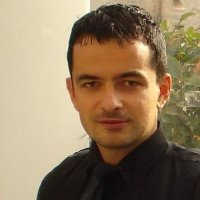
|
Sinisa Rudan - studied Computer Sciences and Engineering at the Electrotechnical faculty in Belgrade. He worked as IT Architect & project manager at Faculty of Mechanical engineering, Belgrade and teached as a guest lecturer at The Faculty of Applied Arts, Belgrade. Currently he is CEO at the Magic Wand Solutions Studio, InfoM - Scientific journal of Information technology and multimedia systems. more |
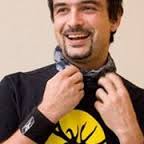
|
Sasha Rudan - is a PhD student at the University of Oslo, multimedia artist and researcher in the fusion of Art, Science and Humanities. His main research addresses collaborative socio-technical systems and implementation and optimization of collective knowledge, intelligence, creativity and scientific dialogue in the context of socio-technical systems. In the parallel, he is interested in social patterns, knowledge management and collective intelligence. Sasha is involved in collaborative socio-technical systems (in business, art, and academia), either architecting them, leading creative transdisciplinary teams or taking entrepre-neur role. more |
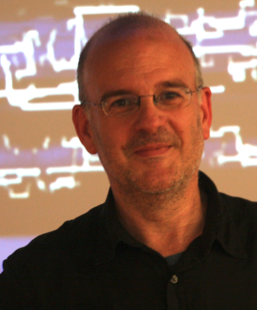
|
Prof. Dr. Ramon Sangüesa - holds a PhD in Artificial Intelligence from the Technical University of Catalonia (1997) and a postgraduate degree in Science Communication (Universitat Pompeu Fabra. Also in 1997). He is Professor (currently on professional leave) at the Polytechnic University of Catalonia (UPC, Computer Science Department), where he acted as Associate Dean for Innovation in its School of Informatics. Sangüesa is Senior Fellow of the Slab, Strategic Innovation Lab, the Ontario College of Art and Design (Toronto, Canada) and Affiliate Researcher at the Center for Organizational Innovation, Department of Sociology, University of Columbia, New York. Furthermore, he founded Citlab, a civic innovation center, in 2007 where he developed urban innovation projects (UrbanLabs 2008 and 2009) and organizational innovation projects such as Breakout in collaboration with the Institute for the Future. Currently he is coordinating the Data Transparency Lab (http://datatransparencylab.org) a non-profit research organization that explores the intersection between technology and society in the era of Big Data. He is specially interested in aspects of the Technoself, identity, and new controversies of the digital society. more
|
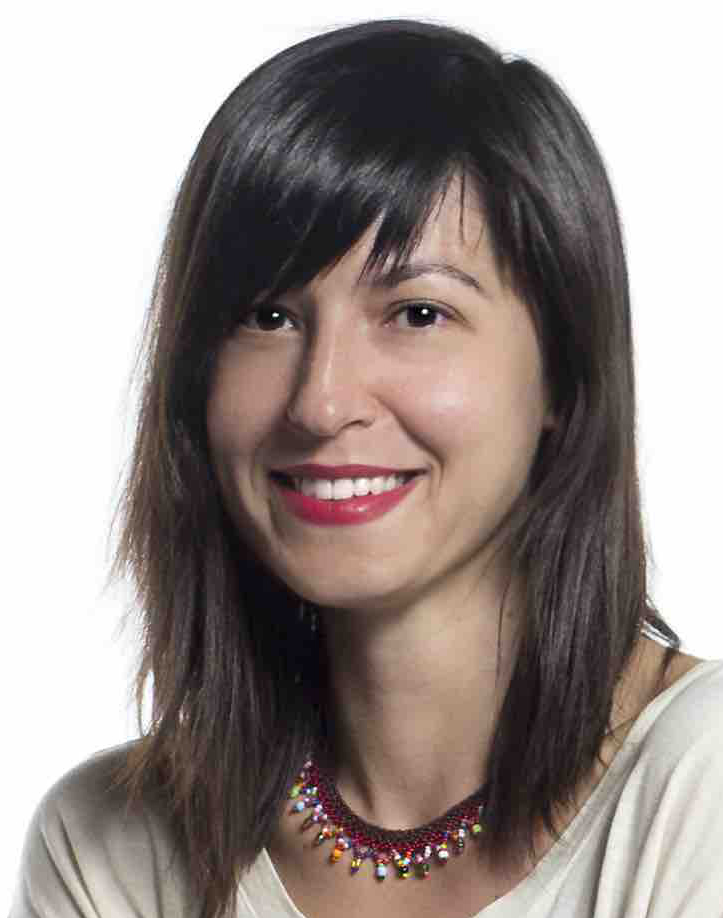
|
Dr. Paz Tornero - has a PhD from the Complutense University of Madrid investigating the fields of art, technology and science. In her research she analyzes the new art forms that incorporate technological and scientific aspects, for example, those artists who work or study in biology and robotics virtual environments for innovation and creativity. She focuses on how certain artists develop their practice by targeting on social issues in that way helping establish new lines of research and more creative communities. She has been a visiting researcher at Harvard University in the School of Engineering and Applied Sciences and at MIT Media Lab. She teaches at COCOA Colegio de Comunicación y Artes Contemporáneas USFQ, Ecuador and the University of Granada, Spain. more |
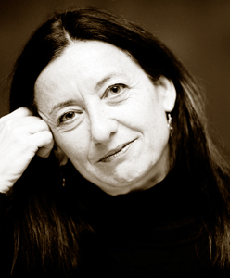
|
Dr. Stella Veciana - Studies in experimental arts (Universität der Künste, Berlin) and computer arts (School of Visual Arts, New York). Doctorate on the intersection of art, science, technology and society (Faculty of Fine Arts, UB). She is the founder of the Research Arts platform dedicated to transdisciplinary and participatory artistic research for sustainability. Her artistic work has been exhibited internationally in museums, galleries, art centers and festivals as well as in foundations, NGOs, universities, research centers and congresses (Akademie der Künste Berlin, Kunsthalle Nürnberg, Hangar Barcelona, UNESCO, Heinrich-Böll Foundation, Bread for the world, ZEF Development Research Center, Degrowth Conference, KIBLIX Festival, etc.). She has extensive university teaching experience (Faculty of Fine Arts Barcelona, Leuphana Universität Lüneburg, Technische Universität Berlin, Universidad Politécnica Valencia, University of Saskatchewan Canada, etc.). Collaborator and researcher in inter/national projects (Forschungswende, Soft Control, PIPES, Living in sustainable villages, etc.). Manager of national and European projects (ICN). Development of higher education learning processes in "real world laboratories" for sustainability (between ecovillages and Leuphana Universität). Member of the Federation of German Scientists VDW. more
|
|